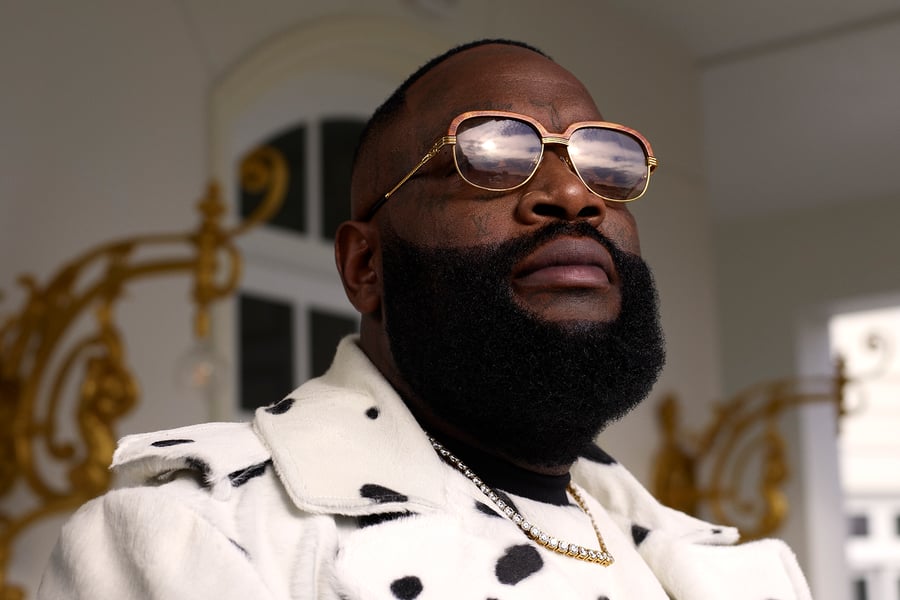Rick Ross, low key, might have invented “yacht rap.” The Miami-bred boss specializes in cigar-to-the-sky manifestos that make the most ruthless coke deals seem like a company cruise. A grizzled behemoth prone to surrealist flights of fancy (and some motivational, meat-and-potatoes grind talk), Ross epitomizes extravagance, largesse, and team goals. He’s like a benevolent Shark Tank titan with coke residue still in his beard.
Ross has spent the last 15 years arguing that artifice is more real than reality. Postmodernist that he is (this is the same guy who wore a chain of himself wearing a chain of himself), he’s made himself into the most absurd and bombastic symbol of a drug lord, something none of us will ever see in real life but encounter constantly in pop culture; he’s like a rap-game facsimile of Don DeLillo‘s Most Photographed Barn in America from White Noise. And he capitalizes on that irreality in his grandiose music and over-the-top image.
Ross’s musical formula is appropriately fantastical. His nimble wordplay always hits a surprising stutter-step pocket—he’s like a big man with some serious handles on the court—that legitimizes his luxuriant trapaholic opulence. On Richer Than I’ve Ever Been, Ross proves that his highfalutin aspirations are a major part of his authenticity.
Opener “Little Havana” sets a credible tone with testimony (”I was the undisputed king in the cocaine industry from the mid-Seventies through the Eighties and into the Nineties”) from former drug czar Willy Falcon. Ross gets an official co-sign from the retired Cocaine Cowboy before laying out a bio that boasts both his alleged underworld bona fides (with Black Mafia Family co-founder Demetrius “Big Meech” Flenory) and boardroom power moves: “I was really throwin’ money, I really saw Meech/And I let them rappin’ niggas get closer to Meek.”
The cinematic “Marathon,” on which eerie orchestration and haunting pianos evoke the soundtrack to a letterbox version of a lost 1970s Roman Polanski classic, is a goosebumps-rendering catechism for Ross’s insistence on the lavish life. “Do it out of opulence/Really it’s just common sense,” he spits, sounding like he’s also encouraging us to secure a bag. This is megachurch gospel if the pastor genuinely wanted his congregation to view every day as another opportunity to touch some paper.
“Wiggle” is a would-be strip-club psalm, which, because it doesn’t convince, begs the question: what is Rick Ross’s legit place in Miami rap? Unlike Luke, Trick Daddy, or his mentor Trina, Rozay doesn’t do unabashed raunch. If anything, he’s a throwback to the mostly East Coast-centric salad days of the late 1990s: his hits feel like classic paeans to flossing rather than ratchet anthems for the turn-up. But “Wiggle” gives us some energetic oomph (and an impressive verse from the Bronx’s DreamDoll), even if it seems tame compared to, say, the colossal “BMF,” which dominated clubs—strip or otherwise—on its hypermasculine terms.
There aren’t many moments of reflection here. Only “Made It Out Alive,” with its soul-bearing hook (”From nothin’ to everything that I asked for/From food stamps to stamps on the passport”) captures the earnest fervor of 2017’s Rather You Than Me. But it’s all smooth sailing on “Imperial High,” where he brags, “Hundred bricks a boy out in St. Croix/For the big-belly-ass rude boy.” Meanwhile, “Hella Smoke,” with its twinkling keys and buoyant bass—enlivened by swank synths—makes an over-the-top flex (”Living lavish, have you married in the Eiffel Tower”) sound as chill as a cuffing-season weekend with the Sunday “Arts & Leisure” section. Rick Ross has turned absurdist clichés into art. What’s more real than that?
Love Music?
Get your daily dose of everything happening in Australian/New Zealand music and globally.
From Rolling Stone US



































